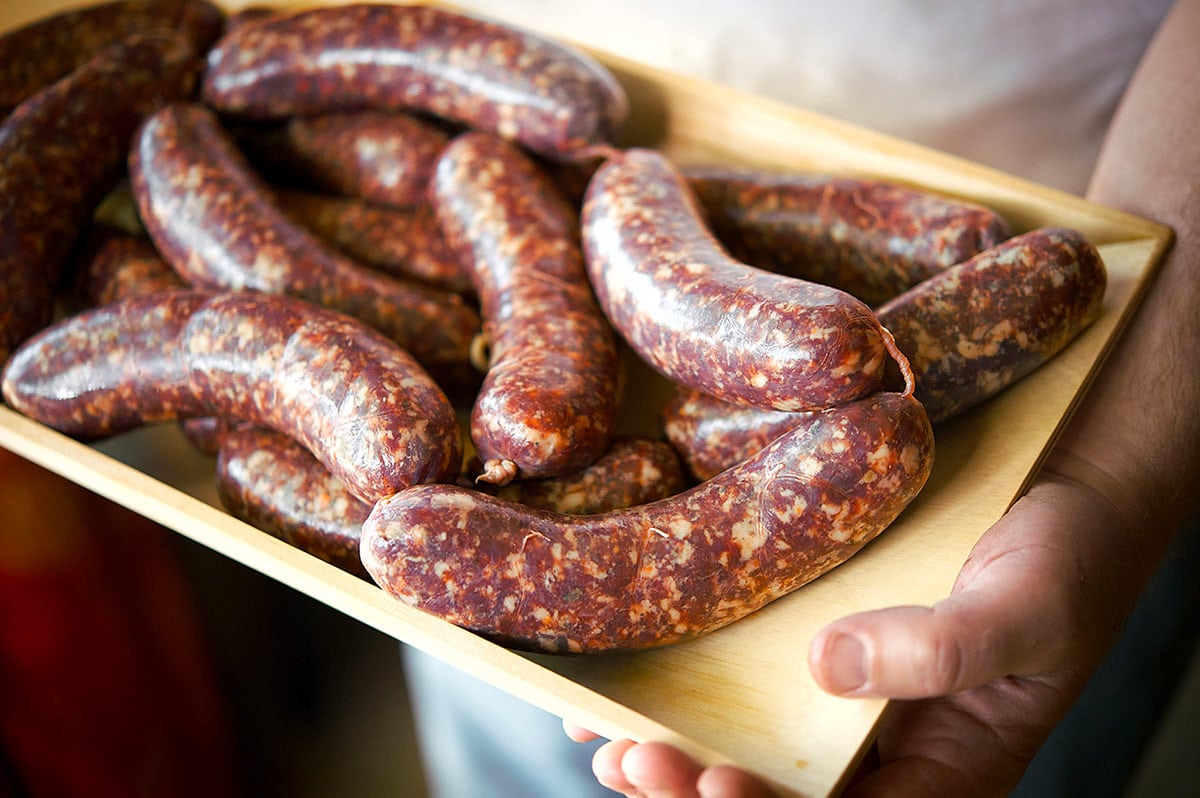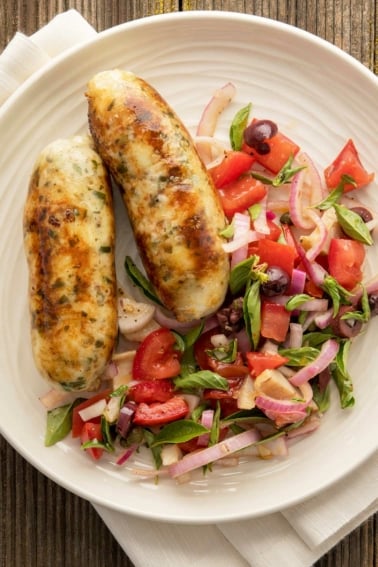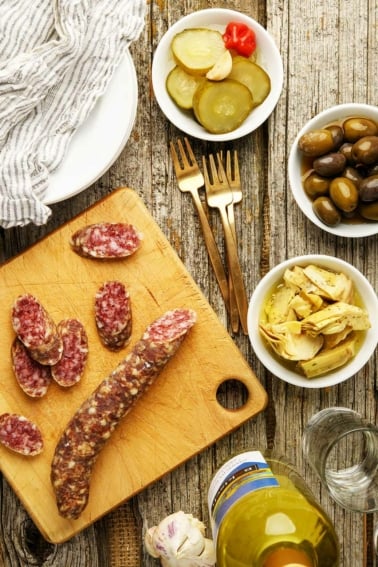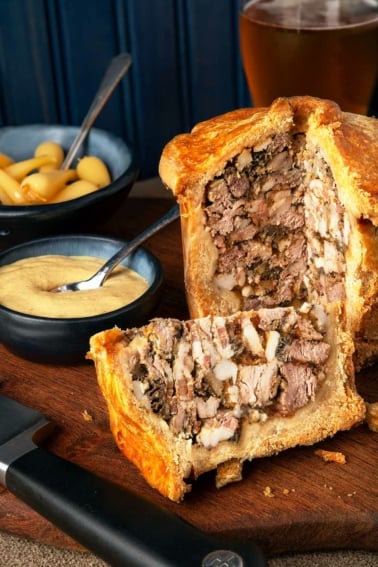Loukaniko: Traditional Greek Sausage
April 24, 2008 | Updated August 01, 2022
As an Amazon Associate I earn from qualifying purchases.
Loukaniko is an ancient sausage, dating back to Classical times. Nowadays it is a coarsely ground Greek country sausage that, like any country sausage, has lots of variation depending on the region and the cook.

For many years Holly and I hosted a Greek-themed, springtime shindig we called our Big Fat Greek Party. We roasted goats and lambs, ate octopus, sometimes grilled sardines. But the mainstay of the party food was always this more or less traditional Greek loukaniko sausage.
To prep this recipe, I researched loukaniko. A lot. And about the only constants I could find are that they must include pork, garlic and citrus peel. Fennel is common, as are cinnamon and minced, cooked leeks. You’ll often see either white or red wine in the mix, too. Loukaniko’s dominant flavors are usually the orange zest, garlic and coriander. You definitely taste the Mediterranean in this link.
Many versions of loukaniko are mixtures of both pork and lamb. I don’t often have lamb in the house, but I do have venison as a stand-in, so my mixture is about two-thirds wild pork with one-third venison trimmings. You can alter that ratio as much as you want.
Loukaniko is best smoked, or cooked on a grill over an open fire. But you can use it in stews or cook it in a frying pan, too.
Making Loukaniko at Home
- Make sure everything you deal with — meat, liquids, equipment — is very cold, as in close to freezing. This really matters, not so much for sanitation, although that’s important, but for the final texture of your sausage. Warm ingredients won’t bind well.
- If you don’t have a sausage grinder and a sausage stuffer, I really don’t recommend you try this recipe. But if you must, you can pulse the meat in small batches in a food processor and stuff it through a wide funnel.
- You will need hog casings for this sausage, although I suppose if you kept kosher and wanted to skip the pork shoulder and use sheep casings, that’d work fine. Soak 5 to 6 lengths of hog casing (about 10 to 15 feet) in warm water for at least 30 minutes before you begin stuffing.
- You will need a rack to hang these links on while they are drying. A hand-wash drying rack works well.
- You may need string to tie off the links, if you need to hang them in a way that doesn’t allow your twisted links to stay twisted. Have this handy, along with scissors.
- You will also need a needle to prick your sausages once they are hanging — this is to release any trapped air. You will see air pockets on some of your sausages. Prick these with your needle. Sterilize it in the burner of your stovetop.
- Try not to eat your loukaniko the same day. All sausages taste better the day after they have “cured” in the fridge overnight. These sausages will in fact cure a bit because of the Instacure, but even without it, the link with firm up and hold its shape better after it rests.
New to making sausage? You can find my detailed tutorial on how to make sausages at home here.
You’ll find some similar sausages on this site, if you want something other than Greek loukaniko. Some other Mediterranean sausages include Spanish butifarra, Italian mazzafegati, and Moroccan merguez.
Greek Loukaniko Sausage
Ingredients
- 1 1/2 pounds lamb or venison trimmings
- 2 1/2 pounds pork or wild boar
- 1 pound pork fat
- 32 grams kosher salt, about 3 tablespoons
- 4 grams Instacure No. 1, about 1 teaspoon (optional)
- 25 grams sugar, about 2 rounded tablespoons
- 5 tablespoons minced fresh garlic
- 1 tablespoon ground coriander seed
- 1 tablespoon cracked black pepper
- 2 tablespoons fennel seeds
- 1 tablespoon crushed dried oregano
- 2 teaspoons dried thyme
- 3 tablespoons grated fresh orange zest
- 1/2 cup white or red wine
- Hog casings
Instructions
- Chop your pork and lamb into rough chunks. Mix in the salt, curing salt (if using) and sugar and grind through a coarse die on your grinder. Put this in the fridge overnight if possible or for at least an hour. The step helps the sausage bind to itself when you stuff it.
- Set aside 1/2 of the coriander, black pepper and fennel seeds in a small bowl. Soak your hog casings in warm water. Put the wine in the fridge. Make sure all your grinding gear is cold.
- Mix the remaining spices with the meat and fat and grind the meat a second time into a bowl. You can grind coarse again or go fine. Your choice. I do half-and-half. Set the bowl for the meat into another bowl full of ice if your room is warmer than 70ºF. Once it's ground, put the meat in the freezer and clean up.
- Get out your stand mixer and find the heavy paddle to it (not the dough hook). If you don’t have one, put the meat mixture in a large bin so you can mix it by hand. Add the orange zest, reserved spices and the wine and mix the sausage well for 2 minutes, or until it forms a sticky, cohesive paste. If you are doing this with your hands, they should ache from the cold.
- Get out your sausage stuffer, which if you’ve been smart has been living in your fridge or freezer for the past few hours. Fit it with the appropriate tube and stuff the sausage. Do it all at once before you twist it into links.
- To twist into links, start at one end and compress the meat into the casing, then tie off the casing. Measure out a good-sized link, then pinch with your fingers. Do the same another good-sized link down the coil. Once you have them both pinched, twist several times to tighten the link well. Repeat on down the line of the coil, then tie off the final link after compressing it, too. (Here is a quick video on twisting sausage links.)
- Once you’ve finished, hang the links so your twisting does not come undone, or tie off each link with string. Use the needle to prick any air pockets, and compress the meat in the casing to fill those pockets; be careful or you can rupture the casing if you do this too roughly.
- Hang your sausages to dry for about 2 hours in a normal room, only 1 hour if the room is warmer than 75ºF. Ideally, you hang the links overnight at about 40ºF.
Nutrition
Nutrition information is automatically calculated, so should only be used as an approximation.






Is there anyplace I can buy/order a ready to grill Greek orange lukaniko? I would really like to know if there is any place that has it prepped for delivery?
Olympia Provisions in Portland
How about a cured version of this with instacure 2 and Fermento Culture , Dextrose? Would it work
I’m interest in making this recipe soon, but am not sure what type if wine works best for it. Any ideas? Thank you for all of your recipes! I’m getting your book soon.
James: Ideally a red sweet wine. Other than that, any red wine.
I just did a batch with half pork and half duck. I also added a cup of sautéed leeks. Great recipe!
Thanks…
If you were going to smoke these, how long and at what temp would you recommend? Thanks!
Bill: A few hours at about 225 Fahrenheit, I suppose.
Omg , I can eat these all day long!!! They are my favorite sausage. I like both the leek & orange ones the best.
Hi, I made this recipe and my sausages are very gray in color. not at all like the deep red in your picture. I used Venison and pork trim, and everything else to the letter of your recipe (except the orange peel). Any ideas? Love the site, Keep up the great work!
Ty: Yep. I added the Instacure No. 1 and smoked mine. They’re normally gray. They cook up fine though!
I’m Greek and my dad makes sausages. I found your recipe because someone told me that they liked greek sausages and I was surprised she even knew they existed. 😛
I mostly wanted to comment on the retsina. I drank a lot of it as a teenager (we can drink before we’re 21 here) and at college because it’s dirt cheap. I grew to love it for that reason only. And I’m pretty sure it’s the same for most Greeks.
xristakis: If you saw the quality of the retsina available in American stores, you would agree with me.
retsina only good enough for cooking?
you my friend are a philistine.
Looks like a fun recipe. I am planning to use it this weekend and smoke the links over Mesquite. I substituted a few ingredients due to cost but I think it will still turn out excelent once allowed to stand for a day or two before smoking. Lamb in Fla is hard to find and pretty expensive so I had to stretch that a bit to make it budget freindly , so my wife doesn’t neuter me for going to the store by myself unsupervised…..
Bob
sounds like a great recipe.I`m going to try this with some of my venison;think it will “work”?
Hank, Stumbled upon your website after googling a recipe for canning tomato sauce, and am in heaven!! As a Greek, hunter, and gardener I really appreciate your recipes…and so will my husband :). Thanks!!!
Thanks for the recs, Hank. What I meant was that no one wants to admit to using nitrites or nitrates because they’re perceived as unnatural. (Botulism is natural, too, but in my mind it’s a big chance to take.)
Hey Audrey, the best place for Instacure is online, at Butcher & Packer or The Sausagemaker. A quick Google search will turn up their info.
And to Ivy, Sam and the Couple that is Never Full? Thanks a heap for the compliments! Hearing that my Xeno-made loukaniko passes muster with the Greeks makes me very happy.
Pretty looking sausage up top there. I’m glad to hear you mention using a pinch of nitrate. Recently I called around to Seattle-area butchers looking for some for my own use. I found it interesting that half were unwilling to admit they used the stuff at all.
I am amazed that you make your own loukanika. I just wanted to tell you that each part of Greece has its own version. The orange zest is from the region of Peloponese and since my in-laws live in Sparta we eat a lot of them. The ones with the leek are from Northern Greece. In Cyprus they are cured in red wine, whole black peppercorns and then smoked.
Ah, Hank you have outdone yourself with this one! Loukaniko is one of my all-time faves… I am certain it was awesome! I will be making some myself, later this year. I still have a couple links left which I am hoping to cook in the next few weeks. My mother used to cut the loukaniko into slices about 1/4 inch thick and fry these up in some olive oil, then sprinkle them with lemon juice and oregano… As a child, I could smell them cooking from down the street where I would play with my friends. Believe me, nothing got me to return home quicker!
This looks absolutely delicious. I can not wait to make sausages one day. We’re going to buy the attachments for our kitchen aid as soon as we save a bit. I HAVE to remember this recipe. I love the play on flavors here.